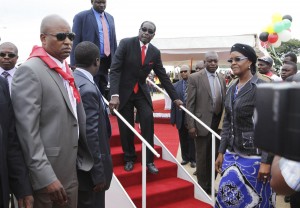
Inside sources said morale among security staff was very low “and most of us are no longer as dedicated to the job as we used to beâ€.
President Robert Mugabe’s trusted spooks in the Central Intelligence Organisation (CIO) have not been spared the current economic problems – with their pay day being moved by almost two weeks.
Sources confided in The Zimbabwean that the dates were moved in May this year as government struggled to mobilise enough revenue to pay public employees on time.
“We used to get our salary mid-month, mostly around the 13th, but the dates have been pushed close to the end of the month, mostly around the 26th,†said a source. CIO operatives are seen as Mugabe’s blue-eyed employees because they provide him with vital information to prop up his increasingly unpopular government. The shift in CIO pay days has generated disgruntlement among the operatives, the sources said.
“Most of us are not happy with this. We used to get preferential treatment, but this is no longer the case. How does the president expect us to be loyal to him when we are being treated like this? Morale is very low among the ranks and most of us are no longer as dedicated to the job as we used to be,†added the source.
$400 a month
He said staff were struggling to budget as they were used to the mid-month pay-out dates. Other intelligence sources said their salaries were poor, with junior officers taking home less than $400 a month.
They said only those that had been given farms or engaged in underhand business deals like poaching or those belonging to close security where they obtained regular allowances were breaking even, while the majority lived from hand-to-mouth. “We are struggling to pay rent or send our children to school. We have become a laughing stock in our neighbourhoods because of the poor salaries. People wonder why those that work for the president live miserable lives. No wonder some of us are resorting to corruption,†said another source.
Mugabe has for a long time been accused of using the spy agency to monitor his opponents as a way of weakening their fight against continued Zanu (PF) rule. CIO operatives have been fingered in torture, murder and the disappearance of people considered enemies of the ruling party.
Serious divisions
The source said serious divisions within CIO had worsened disgruntlement especially in the rank and file. Operatives that have been linked to ousted former deputy president, Joice Mujuru, are reportedly being side-lined from income-generating external trips while those that are seen as Mugabe loyalists are the ones being handsomely rewarded.
CIO director general, Happyton Bonyongwe, was named as a Mujuru loyalist and reported to have been lined up for dismissal.
His contract has been renewed for another year, but he has reportedly been reduced to a sitting duck as major decisions are being made by his juniors.
Some of the officers linked to Mujuru have already been dismissed or reassigned, said the sources, resulting in widespread fear of victimisation as agents are being labelled and unfairly punished.
Since the contested 2013 general elections that Mugabe and Zanu (PF) “wonâ€, the economy has been in a free fall, with government struggling to raise enough money to pay civil servants and fund key public projects. As a result, salaries have either been delayed or pushed to other dates.
Extreme measures
Government -controlled institutions such as parastatals, colleges and universities have also been affected.
The Civil Service Commission (CSC) at the beginning of the year released a new schedule of paydays whereby most civil servants were moved from slightly after mid-month to the end of the month.
These include teachers, nurses, the army and line ministry employees, in addition to pensioners and war veterans.
In desperation, government, through the Zimbabwe Revenue Authority (Zimra) has adopted extreme measures to increase revenue, among them garnishing companies and extending taxation to the informal sector.
Post published in: Featured


The more President Mugabe tries to ignore economic meltdown the harder it comes back to bite him in the butt! The economic situation is socially and economically and politically unsustainable!